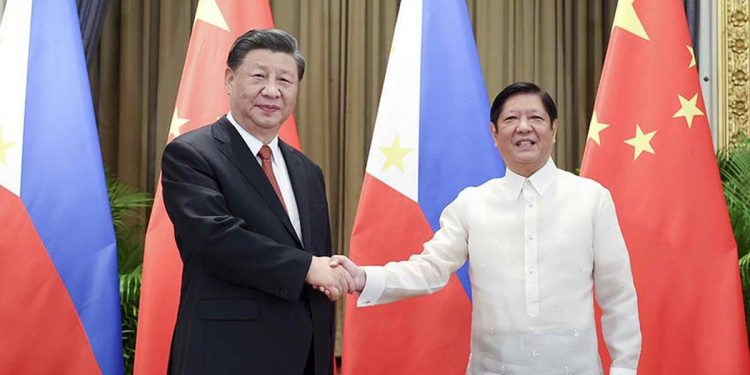The Philippine President Ferdinand Romualdez Marcos Jr’s three-day visit to China from 3 January when he will meet China’s President Xi Jinping and other top leaders will be a test of his policy of “friend to all and enemy to none.” The exchanges will influence geopolitical equations in the South China Sea region as both China and the US are wooing the Philippines to checkmate each other in the strategically important area. The US has forged ties with the Philippines for providing assistance in the event of attacks by China. This has caused anxieties in Beijing as China is embroiled with the Philippines over control of the South China Sea. According to reports, Chinese fishing boats were seen last week carrying out landfill work at four reef sites around the Spratly Islands, a disputed archipelago claimed by both Beijing and Manila, as well as Taiwan, Malaysia, Vietnam and Brunei.
The Philippine military reacted to the reports and expressed its “serious concern.” It vowed to increase its presence. China, however, dismissed the reports as fictitious. Washington, on the other hand, issued a statement to support Manila’s “continued calls on Beijing to respect the international law of the sea in the South China Sea.” The thorny issue of maritime disputes will be discussed during Marcos’ trip along with areas of cooperation in bilateral trade, infrastructure development, energy and communications.
The meeting between Xi and Marcos is dictated by both domestic and international compulsions. Just as the Philippines likes to continue its policy of bilateral cooperation with China, China is also keen on weaning the Philippines away from the orbit of US influence. The situation has been succinctly summed up by Philippines’ foreign affairs assistant secretary Nathaniel Imperial who said both sides have agreed to sign an agreement establishing direct communication between the foreign ministries of both countries “to avoid miscalculation and miscommunication in the West Philippine Sea.” The comments also signal a reconciliatory approach and a balancing act.
The President himself has hinted as much in his remarks that the maritime issues do not define “the totality of our relationship with China.” In the same breath he has acknowledged the importance of this issue, according to his foreign affairs official.
Marcos’ visit is expected to lead to 1.5 billion yuan (US$217 million) in Chinese grants for the Philippines as well as tourism and infrastructure deals. Though similar agreements were signed between the two countries during the tenure of Marcos’ predecessor, former President Rodrigo Duterte, only a few produced tangible results. This was despite the fact that Duterte had friendly relations with China. As such, Marcos’ visit will be a test of his abilities to navigate his country’s relations with China and the US. Marcos has to show that his independent foreign policy is efficacious as he engages with China.
Incidentally, Marcos’ trip to China comes only a month after he met visiting US Vice President Kamala Harris who pledged the commitment of Washington to its ally.
Marcos’ engagement with China will also have a bearing on his domestic support base. He has been trying to project an image that he will defend the country at all costs. This will add legitimacy to his presidency. The South China Sea issue will bring out the Marcos administration’s position on engaging international partners, but more importantly it will address a domestic audience to strengthen the President’s support base. China’s news agency has put out the news about Marcos’ meeting with Xi in a big way.
This underlines the importance China is attaching to the Philippines as it is under pressure following efforts by the US, the UK and Australia forming the AUKUS grouping to frustrate China’s ambitions over control of the South China Sea. China’s spokesperson Wang Wenbin’s superlative praise of the Philippines prior to Marcos’ visit makes clear China’s intent to mollify its neighbour. He said, “China looks forward to working with the Philippines to make this visit an opportunity to carry forward friendship, deepen mutual trust and continue to advance cooperation in the four key areas as good neighbours, good relatives and good partners.”
The fact that the meeting is on even after a fresh surge of COVID-19 in China shows the desperation of China to keep its borders open for the country’s economic growth and also thwart efforts of the US and its Western allies to corner it.






































